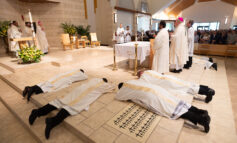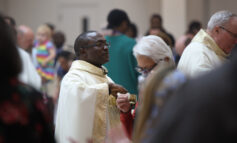By Father John Bayer
Special to The Texas Catholic
I do not often go to the movies, but I do try to see everything I can by the director Terrence Malick, since I think he is for movies what Michelangelo was for marble — a master of the medium like no other. His most recent movie, “A Hidden Life,” is one of the most interiorly beautiful movies I’ve ever seen. It recounts the history of Franz Jägerstätter (1907-1943), an Austrian conscientious objector and martyr of World War II, who was beatified on Oct. 26, 2007. So far as I can tell, it is faithful to the major biography written about Jägerstätter, “In Solitary Witness” by Gordon Zahn, as well as to the beautiful correspondence maintained by Franz and his wife Franziska while he was in prison (his writings, which are a really edifying read, can be obtained in a single volume, “Franz Jägerstätter: Letters and Writings from Prison,” edited by Erna Putz and translated by Robert A. Krieg).
Said all too briefly, the history of Bl. Jägerstätter is the story of someone who followed his conscience against all the currents in his society — his family, his mountain village, his nation, and even his local church. The only one who supported him in his refusal to swear allegiance to Hitler and to serve in the Nazi army was his wife. She did not argue him into his position of conscientious objection, and of course she wanted him to find a way to preserve his life; but when she saw that his conscience was settled, she stood by him faithfully no matter the suffering it brought to them and their family.
I think there is much in his legacy that is relevant today, much that he can teach us about God, authentic faith and freedom, conscience, marriage, culture and the Church. Here I can focus on just one lesson, but I would highly encourage anyone with eyes to read about him and to watch Malick’s movie. And if you missed it, check out Father Thomas Esposito’s article on Jägerstätter in the last issue of The Texas Catholic!
The lesson I want to highlight here concerns the role of spiritual reading and prayer for the cultivation of a soul strong enough to stand fast in a crisis. Ultimately, of course, grace makes the martyr; but we can still look for the modes through which grace works. For Jägerstätter, one way was his resolution to read, pray and frequent the sacraments. He was not a bookworm, since he was a farmer whose formal education ended at fourteen. And yet he was known for his piety, even criticized for it, especially when his allegedly “excessive” religiosity brought him to disagree with others about Nazism, or when he started pausing during his labor to jot down a thought or prayer in his notebook.
He was convinced about the importance of a devotional life especially for those living in hostile cultures. So, he compared Christian life to a journey. When someone makes a long journey, he first decides whether to study his maps beforehand or only to consult them along the way. But what happens to the one who did not study beforehand when his maps are suddenly taken away as he passes through enemy territory? He gets lost, while the one who had diligently internalized the maps can still find his way.
In the life of conscience, or in the journey to salvation, we are at times more or less alone. In moments of solitude, we will be grateful for every insight we had learned, every prayer we had memorized, every witness to faith we had known. Jägerstätter writes, “There may have been a time when this goal [of salvation] was easier to attain without having to read. Then there were trustworthy guides in many places, guides who themselves were on the right path. A traveler could calmly walk in their footsteps. Further, these guides were not shy about making clear to others when they were going in the wrong direction. But not today! We now find ourselves in an enemy land in which either the guides give us maps that are at best falsified, or they give us nothing” (E. Putz, Franz Jägerstätter, 169).
Jägerstätter was particularly pained by the lack of priests – the “guides” – bearing witness in his times. But he knew that by the 1940s, thousands of priests ready to speak about the evils of the age had already been sent to Dachau and other camps. One of his great consolations, in fact, was knowing that just months before his execution a priest had gone to death for the same charge – refusing to swear allegiance to Hitler. So, he knew scandal in the Church! But he understood the distinction in unity between the flesh and blood Church, full of sinful pilgrims journeying to our heavenly homeland, and, on the other hand, the spiritual reality of the saints and sacraments. In this way, he could accept the bitter disappointment of seeing millions of Catholics, lay and clergy alike, compromising themselves, from his point of view, by their support, however reluctant, for a hostile culture.
Where are your maps? What will be the next book you read? The next show or movie? The next vacation? Where are your maps?
Father John Bayer, O.Cist., is a theologian and monk at the Cistercian Abbey of Our Lady of Dallas.



